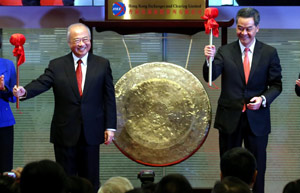Luxury hotels chains expand in China
Updated: 2014-11-24 11:06
By Zheng Xin in Beijing(China Daily USA)
|
||||||||
International luxury hotel chains, eyeing a rapidly expanding Chinese middle class with a taste for the upscale, are making moves to cater to that population with hotels in second- and third-tier cities in China.
Hotels such as JW Marriott and Sofitel either have finer hotels under construction or proposals to build new ones in the country's second- and third-tier cities. The tiers refer to the characteristics of a city or region, generally cities with populations and economic development below leading cities such as Beijing and Shanghai. In the US, think New York or Chicago compared to Newark or Cincinnati.
Still, in China, even the lower-tier cities or regions can boast populations of several millions, though with less advanced infrastructure and transportation systems.
The Marriott recently wrapped up reconstruction of a 454-room hotel in the downtown Chongqing, and is due to welcome its first wave of guests in December. The renovation was undertaken to address the needs of the growing well-healed population in the southwestern municipality.
The luxury chain plans to expand from 16 cities in 13 provinces, municipalities and special administrative regions, to more than 59 cities in 27 provinces, municipalities, autonomous regions and special administrative regions across China by 2017.
Marriott International, which has plans to open a new hotel in Asia weekly, expects to more than double in size in Asia through 2016, from the more than 150 hotels currently, to more than 350 in 19 countries.
According to Simon Cooper, president and managing director of Marriott International Asia, most of the proposed hotels in China will largely be built in second- and third-tier cities, including Tianjin, Yiwu, Chengdu, Chongqing, Changzhou, Ningbo and Zhuzhou.
And Marriott is not alone.
Sofitel proposes to build eight more hotels on Mainland China by 2017, with four more in the blueprint stage, while Banyan Tree Hotels and Resorts, an international luxury group, also plans to open hotels and resorts in Yangshuo and Huangshan this year.
Marco Polo Hotels, the long established Hong Kong-based hotel management company of The Wharf (Holdings) Ltd., plans to launch its first new brand, Niccolo by Marco Polo, since the hotel group's inception in 1986.
The first Niccolo hotel will open in the first quarter of next year within the group's newly opened International Finance Square Chengdu in Sichuan province, another second-tier city in China.
"As the middle class in the country keeps increasing, the purchasing capacity of the second- and third-tier cities keeps surging," said Miao Jianwei, general manager of the JW Marriott Hotel Chongqing. "And the market of the sector in these lower tier cities is still hot."
According to a report by IBIS World, a market researcher, the hotel revenue in China will soar to $56.2 billion by 2017.
A report by McKinsey and Company also states that by 2020, half of urban Chinese households will have disposable income between $16,000 and $34,000, which illustrates that more households will be able to afford travel.
The increasing disposable income has directly influenced the spending habits of the Chinese as well.
According to a report released by the tourism shopping company Global Blue, Chinese tourists remain the biggest spenders on travels overseas, with their average spending on overseas travel in the first quarter growing 25 percent year-on-year to 846 euros ($1,150) per person, compared with the global average of 502 euros.
"The luxury chain hotels are here, with their first class service and facilities, to meet the growing middle class and their growing demand," Miao said.
International hotel brands are expected to increasingly target lower-tier Chinese cities despite increasing challenges in the sector, according to Knight Frank.

 Sports moments of the week: Nov 17-23
Sports moments of the week: Nov 17-23
 42nd American Music Awards held in Los Angeles
42nd American Music Awards held in Los Angeles
 A retrospection of righted wrongs
A retrospection of righted wrongs
 Top 10 kinds of foreigners in China
Top 10 kinds of foreigners in China
 Anxious Ferguson waits for grand jury's decision
Anxious Ferguson waits for grand jury's decision
 Mascots from Olympic, Paralympic games arrive in Rio
Mascots from Olympic, Paralympic games arrive in Rio
 China's boxer Zou Shiming defeats unbeaten Thai
China's boxer Zou Shiming defeats unbeaten Thai
 Mountains echo to the sound of music
Mountains echo to the sound of music
Most Viewed
Editor's Picks

|

|

|

|

|

|
Today's Top News
US aids in return of economic fugitives
LA mayor touts city's ties to China
Wall St ends at records on central bank action
US admiral sees balance in US-China relationship
New York leads way in boom in real estate
Hagel resigning as US defense secretary
80% of China's rich aspire to overseas education
Luxury hotels chains expand in China
US Weekly

|

|







